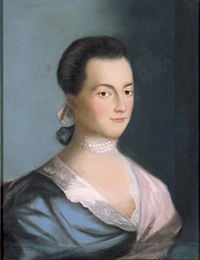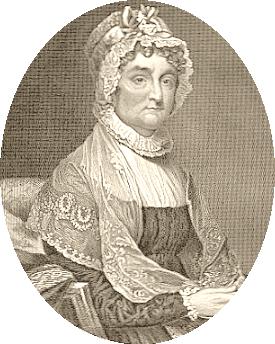Abigail Adams
|
||||||||||||
Abigail Smith Adams (November 11, 1744–October 28, 1818) was the wife of the second President of the United States, and is seen as the second First Lady of the United States, though that term was not coined until after her death.
Early life
Born in Weymouth, Massachusetts, Abigail lacked formal education. On her mother's side she was descended from the Quincys, a family of great prestige in the Massachusetts colony; her father and other forebearers were Congregational ministers, leaders in a society that held its clergy in high esteem.
At a young age, Abigail's father urged her to read, and she did so voraciously. Although she had not received a formal education, her father had a large library of books to which he gave Abigail unfettered access. Developed solely from self-education, Abigail's ideas on women's rights and government would eventually play a major role—although indirectly—in the founding of the United States.
Marriage to John Adams
Abigail Smith married John Adams in 1764. The young couple lived on John's small farm at Braintree (later renamed Quincy) or in Boston as his practice expanded. In ten years she bore five children: Abigail Amelia (1765-1813), future President John Quincy Adams (1767-1848), Susanna Boylston (1768-70), Thomas Boylston (1772-1832), and a daughter named Elizabeth (stillborn 1775).
A cairn now crowns the nearby hill from which she and her son John Quincy watched the Battle of Bunker Hill and burning of Charlstown. At that time she was minding the children of Dr. Joseph Warren, President of the Massachusetts Provincial Congress, who was killed in the battle.
Abigail Adams is remembered today for the many letters she wrote to her husband while he served his country in Philadelphia, Pennsylvania, during the Continental Congresses and the Constitutional Convention. Many consider them to be invaluable eyewitness accounts of the Revolutionary War homefront as well as excellent sources of political commentary.
John Adams frequently sought the advice of his wife, and their letters are filled with intellectual discussions on government and politics. Passages from those letters figured prominently in songs from the Broadway musical 1776 (and the 1972 film of it, with Virginia Vestoff as Abigail Adams). She is perhaps best known for her request that he and the Continental Congress...
- ...remember the ladies, and be more generous and favorable to them than your ancestors. Do not put such unlimited power into the hands of the Husbands. Remember all Men would be tyrants if they could. If particular care and attention is not paid to the Laidies [sic] we are determined to foment a Rebellion, and will not hold ourselves bound by any Laws in which we have no voice, or Representation.
In 1784, she joined John Adams at his diplomatic post in Paris. After 1785, she filled the role of wife of the first United States Minister to the Kingdom of Great Britain. They returned in 1788 to a house known as the "Old House" in Quincy, which she set about vigorously enlarging and remodeling. It is still standing and open to the public as part of Adams National Historical Park.
As wife of the second President of the United States, Abigail became a good friend to Martha Washington and helped in official entertaining, drawing on her experience of courts and society abroad. After 1791, poor health forced her to spend most of her time in Quincy.
As "First Lady", and after
When John Adams was elected President of the United States, she continued a formal pattern of entertaining, becoming the first hostess of the yet uncompleted White House. Her account of the new but very incomplete Georgian mansion is quite entertaining: fires had to be lit constantly to keep the cold, cavernous place warm and she describes setting up her laundry in one of the great rooms.
Abigail and John retired to Quincy in 1801. Abigail died in 1818 of typhoid fever, and is buried beside her husband in the United First Parish Church (also known as the Church of the Presidents). Her last words were "Do not grieve, my friend, my dearest friend. I am ready to go. And John, it will not be long".
An Adams Memorial is proposed in Washington, D.C., honoring Abigail, her husband, and other members of their family.
| Preceded by: Martha Washington |
First Lady of the United States 1797–1801 |
Succeeded by: Martha Jefferson Randolph |
Further reading
- Levin, Phyllis Lee. Abigail Adams: A Biography (©1987).
Credits
New World Encyclopedia writers and editors rewrote and completed the Wikipedia article in accordance with New World Encyclopedia standards. This article abides by terms of the Creative Commons CC-by-sa 3.0 License (CC-by-sa), which may be used and disseminated with proper attribution. Credit is due under the terms of this license that can reference both the New World Encyclopedia contributors and the selfless volunteer contributors of the Wikimedia Foundation. To cite this article click here for a list of acceptable citing formats.The history of earlier contributions by wikipedians is accessible to researchers here:
The history of this article since it was imported to New World Encyclopedia:
Note: Some restrictions may apply to use of individual images which are separately licensed.


